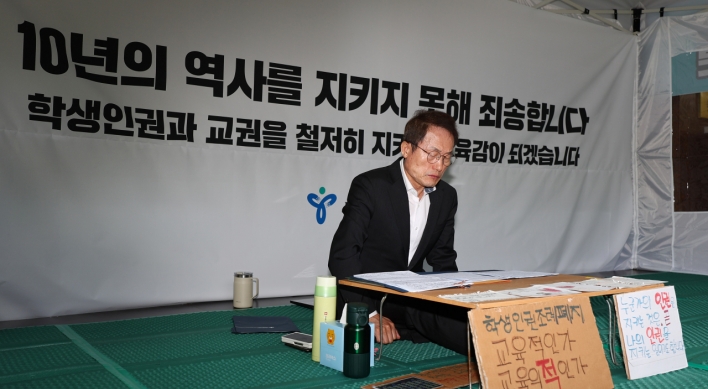Japan's military won't meddle in Korean Peninsula conflict: Japan official
By 임정요Published : Dec. 9, 2016 - 11:23
Japan's military will not enter South Korean territory even in the event of a conflict breaking out unless it receives a request for assistance from Seoul, a Japanese foreign ministry official said.
"As long as we don't get a request, we will not come to (South Korea) unilaterally ... It definitely requires approval from South Korea," the official told a group of South Korean journalists in a background briefing on Tuesday at the foreign ministry in Tokyo.
South Korea is wary of Japan's push for a bigger military role in the region, a legacy of Japan's colonial control of the Korean Peninsula from 1910 through 1945.
Last year, Japan revised its interpretation of the peaceful constitution, allowing its military forces to fight alongside its allies in foreign territory as part of the right to collective self-defense.
"Above all, South Korea's request should come first" in order for the Japanese forces to be able to get involved in any military activities in their territory, he said. "The condition that Japan's peace and stability have been gravely threatened should first be met before invoking the collective self-defense right," the official also pointed out.
"There will be no chance that Japan would go it alone and launch attacks on North Korea unilaterally," the official said, being asked what action Japan will take in the event of North Korea starting a war on the peninsula.
A Japanese defense ministry official, meanwhile, highlighted increased efforts on the South Korean and Japanese sides to raise the incoming Donald Trump administration's understanding on the defense cost issue.
During his presidential campaign, the US President-elect has criticized the two allies for free-riding on the US defense budget.
"The most important thing is to let the new Trump administration be aware of exactly how much (Japan) is contributing," he told the journalist group in a separate background briefing. (Yonhap)
"As long as we don't get a request, we will not come to (South Korea) unilaterally ... It definitely requires approval from South Korea," the official told a group of South Korean journalists in a background briefing on Tuesday at the foreign ministry in Tokyo.
South Korea is wary of Japan's push for a bigger military role in the region, a legacy of Japan's colonial control of the Korean Peninsula from 1910 through 1945.
Last year, Japan revised its interpretation of the peaceful constitution, allowing its military forces to fight alongside its allies in foreign territory as part of the right to collective self-defense.
"Above all, South Korea's request should come first" in order for the Japanese forces to be able to get involved in any military activities in their territory, he said. "The condition that Japan's peace and stability have been gravely threatened should first be met before invoking the collective self-defense right," the official also pointed out.
"There will be no chance that Japan would go it alone and launch attacks on North Korea unilaterally," the official said, being asked what action Japan will take in the event of North Korea starting a war on the peninsula.
A Japanese defense ministry official, meanwhile, highlighted increased efforts on the South Korean and Japanese sides to raise the incoming Donald Trump administration's understanding on the defense cost issue.
During his presidential campaign, the US President-elect has criticized the two allies for free-riding on the US defense budget.
"The most important thing is to let the new Trump administration be aware of exactly how much (Japan) is contributing," he told the journalist group in a separate background briefing. (Yonhap)





![[KH Explains] No more 'Michael' at Kakao Games](http://res.heraldm.com/phpwas/restmb_idxmake.php?idx=644&simg=/content/image/2024/04/28/20240428050183_0.jpg&u=20240428180321)












![[Herald Interview] Mistakes turn into blessings in street performance, director says](http://res.heraldm.com/phpwas/restmb_idxmake.php?idx=652&simg=/content/image/2024/04/28/20240428050150_0.jpg&u=20240428174656)
